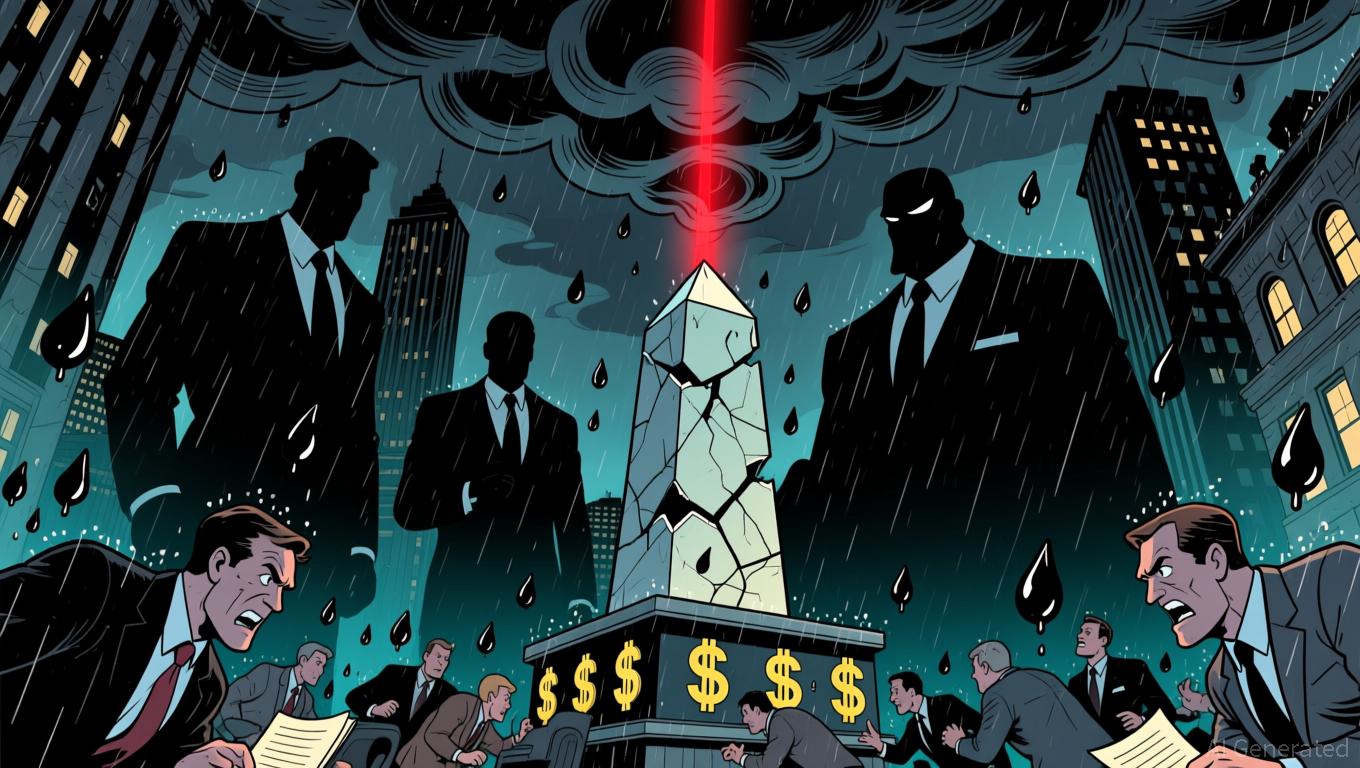Eurojust Dismantles €100M Cryptocurrency Fraud, Revealing Weaknesses in International Regulation
- Eurojust and Europol dismantled a €100M cross-border crypto scam, arresting 5 suspects across 5 EU nations in a historic takedown. - The scheme defrauded over 100 victims in 23 countries since 2018, using fake high-return platforms and rerouting funds to Lithuanian accounts. - Global crypto fraud surged in 2025, with $12.5B lost in the U.S. alone, exposing regulatory gaps as scammers exploit cross-border loopholes and AI tools. - Authorities highlight the need for stricter oversight under frameworks like

Source: [5] Eurojust Coordinates Action to Halt Cryptocurrency Fraud [9] European Police Dismantle €100M Crypto Fraud Ring
---
September 2025 saw significant turbulence in the global cryptocurrency sector, largely triggered by major fraud incidents and increased regulatory enforcement. In a coordinated effort, Eurojust and Europol led European authorities in breaking up a cross-border crypto investment fraud worth €100 million ($118 million), which had deceived more than 100 people in 23 countries since 2018. Five individuals were taken into custody across Spain, Portugal, Italy, Romania, and Bulgaria, and authorities froze assets and accounts tied to the operation. This crackdown, considered among the largest in the EU, targeted a sophisticated investment platform that lured victims with promises of high returns. The stolen funds were funneled into Lithuanian accounts, and after paying extra fees, victims were blocked from withdrawing their money.
This major bust comes amid a broader increase in crypto-related scams. According to the U.S. Federal Trade Commission (FTC), Americans lost a record $12.5 billion to fraud in 2024, with $5.7 billion attributed to investment scams—a sharp rise from $3.8 billion in 2022. Chainalysis also reported a social engineering breach in September 2025 targeting the
Regulators have stepped up their efforts as well. In early September, South Korea’s Seoul Metropolitan Police Agency broke up another $30 million fraud ring that targeted business leaders. This scheme used phishing and impersonation tactics to steal personal information for further theft. These incidents highlight how crypto scams are becoming more advanced, now using AI to build convincing platforms and taking advantage of international regulatory gaps.
The market upheaval in September also coincided with growing institutional interest in
Amid these developments, investors have become more wary. Experts caution that promises of guaranteed high returns and a lack of technical knowledge among retail investors make them easy targets for scams. The U.S. FTC found that 79% of those scammed in investment schemes lost money, with a median loss exceeding $9,000. Meanwhile, European regulators are working to strike a balance between fostering innovation and ensuring oversight, as the Markets in Crypto-Assets (MiCAR) regulations introduce stricter compliance standards for crypto service providers.
The events of September underscore the urgent need for international collaboration to combat crypto fraud. While authorities have made strides in dismantling criminal groups, the continued prevalence of large-scale scams points to ongoing weaknesses in regulatory systems. As the industry evolves, the key challenge will be to match rapid technological progress with effective regulations that can rebuild investor confidence and maintain financial stability.
Disclaimer: The content of this article solely reflects the author's opinion and does not represent the platform in any capacity. This article is not intended to serve as a reference for making investment decisions.
You may also like
Bitcoin News Today: Bitcoin Drops 30%: Market Correction or On the Brink of a Crash?
- Bitcoin fell 30% from October's peak to $86,000, driven by regulatory uncertainty, macroeconomic risks, and institutional caution. - The U.S. government's Bitcoin for America Act proposal adds volatility by enabling BTC payments for federal obligations. - ETF outflows, whale liquidations, and bearish options signal market distress, though industry leaders call the correction "healthy." - A potential "death cross" and oversold conditions suggest further declines to $30,000 remain possible amid Fed policy

Bitcoin Updates: Bulls Encounter Major Challenge: Will Bitcoin Recover Important Levels After a 30% Decline?
- Bitcoin fell below $87,000 in Nov 2025, triggering $914M liquidations and pushing its unrealized loss ratio to 8.5%, signaling bearish sentiment. - ETF outflows hit $903M in one day, with BlackRock's IBIT losing $355.5M, attributed to institutional profit-taking and year-end risk-off moves. - Japan's $135B stimulus and Fed rate-cut uncertainty deepened selling, while Ark Invest added $39.6M in crypto firms amid price declines. - On-chain data shows $66.4M in losses from whale liquidations, but miners' ac

Bitcoin News Today: Bitcoin’s Sharp Decline: Gauging the World’s Appetite for Risk
- Bitcoin fell below $86,000, sparking stability concerns due to macroeconomic pressures, institutional caution, and shifting investor sentiment. - ETF outflows and $2B in exchange deposits, plus BlackRock's $523M redemption, intensified bearish fears as net unrealized profit hit 2025 lows. - New projects like Bitcoin Munari aim to leverage market fragmentation, but success depends on uncertain broader stability and regulatory progress. - Institutions show mixed signals: Strategy Inc. reported $2.8B gains

Fed Policy Changes and the Increasing Link with Solana (SOL)
- Fed's 2025-2026 shift from QT to QE injects liquidity, impacting Solana's volatile market dynamics. - Japan's rising JGB yields influence U.S. Treasury dynamics, while Solana's price drops 32.5% amid ETF inflows. - Solana's DApp revenue rises but active wallets plummet, while ETFs drive $342M inflows despite price declines. - Derivatives show reduced leveraged bets ($7.2B OI) but positive funding rates signal institutional bullishness on Solana's long-term potential. - Macroeconomic volatility and Solana